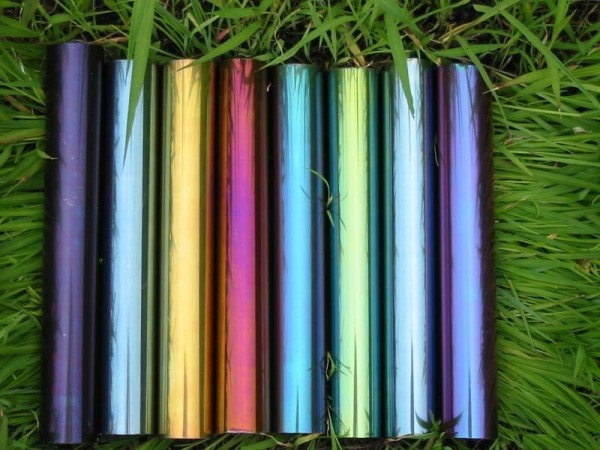
From the Internet
Specifying coloured stainless steel finishes and their applications
Introduction
Stainless steel can be coloured either by the application of paint or by chemical treatments. Both are durable
in normal service, but damage can be difficult to repair, especially for finishes produced by chemical
treatment. Paint systems rely upon introducing a second layer of material onto the surface of the stainless
steel whereas chemical systems rely upon altering the thickness and nature of the passive film.
This article describes the specification and applications for chemically coloured stainless steel flat products.
The source of much of the information in this article is:
Colouring Stainless Steel by Euro Inox.
Producing chemically coloured finishes on stainless steel
Colouring of stainless steel is normally restricted to sheet products, and although it is possible to colour
fabricated components. Only the finest quality stainless steel sheet can be successfully chemically coloured
on a production basis.
Chemical colouring of stainless steel sheet uses a mixture of chromic and sulphuric acids that develop the
thickness of the naturally occurring passive film on the steel surface, depending on the immersion time. It is
a two stage immersion process that requires close control on the operation’s parameters and a considerable
operator skill to get the required colour consistency. A far less frequently produced ‘blackened’ finish can be
done by immersion on a fused sodium dichromate salt bath at around 400 C. This will not be discussed
further in this article.
The colours produced are the result of light wave interference effects in as light is reflected from the surface
of the thickened oxide passive layer and interface of the passive layer and steel surface. The sequence of
colours formed as the film grows in thickness ranges through bronze, blue, black, charcoal, gold, red-violet
and green. With care, intermediate colours are possible. The finished thickness of the passive film ranges
from 0.02 microns to produce a bronze colour effect to 0.36 microns to produce a green colour effect.
between the passive layer and the steel surface of the sheet.
The range of colours commercially available on austenitic 1.4301 (304) and 1.4401 (316) grades includes blue,
black, bronze, gold, green and red/violet. A charcoal colour effect can be produced by treating a satin
polished sheet to the same conditions that normally produce a blue on non-polished sheet surfaces.
The range of colours possible on ferritic grade 1.4016 (430) material is generally more restricted.
A wide range of pre-finished surfaces can be coloured. These include flat mechanically ground,
polished (satin) or blasted finishes or roll-patterned surfaces. Colouring can also be combined with acid
etched patterns to provide an even wider range of textures, lusters and reflectivity effects.
Comparison with anodized, painted and oxidized surfaces
Unlike anodizing, as used widely on aluminium products, the process is not an electrochemical one and in
contrast to painting, there are no pigments or colouring chemicals used. Perhaps more important the
process does not rely on heat to oxidize the surface, like the temper colours on heating at temperatures
between 300 and 600 C. In contrast to these oxidized surfaces, chemically coloured stainless steel retains
the aqueous (atmospheric) corrosion resistance of the un-coloured surface.
Surface Blackening
This is a chemical process involving the use of molten sodium dichromate. Immersion time controls the
degree of “blackness” achieved. The oxide film thus formed is quite adherent, allowing reasonable formability.
PVD Coatings (Physical Vapour Deposition)
This involves depositing a very thin layer of ceramic material (typically 0.3 micron). This allows the substrate
texture to show through. A range of colours is possible with this process - gold, bronze, blue, black and red.
Specifying coloured stainless steel products
Table 6 of BS EN 10088-2 uses special finish 2L for coloured flat products. This restricts the starting material
to cold rolled only (hot rolled finishes are not suitable for a good standard of coloured finish) and only one
side is required to meet the agreed colour tone and surface quality. The standard does not specify specific
colours. This is to be agreed between the specifier and the supplier.
Suppliers of these finished sheet products produce handy swatch samples to aide the finish selection process.
Applications for coloured stainless steel sheets
A particular attraction of chemically coloured stainless steel is that it appears to change colour under
different shades and angles of artificial and natural light. It is important, however to ensure that a good
match is achieved between sheets intended for multiple panel features.
Applications for these coloured sheets and panels include architectural external cladding (facades, columns,
roofing etc.), internal cladding in low traffic areas, signs, shop display panels, sculptures etc.
Coloured stainless steel is difficult to repair if scratched which is why it is best suited to these
applications where scratches and abrasion are relatively unlikely. Cold forming of coloured sheet during
fabrication is feasible however, provided the surfaces are suitably protected from scratch damage.
Joining by heat process, including welding is not advisable as changes to the original colour are very
difficult to repair or blend-in. Joining by cold processes such as adhesive bonding and mechanical fixing
are however suitable.
It is important that the steel sheets are sourced from the same mill supplier and batch run to obtain
consistency of overall appearance.

